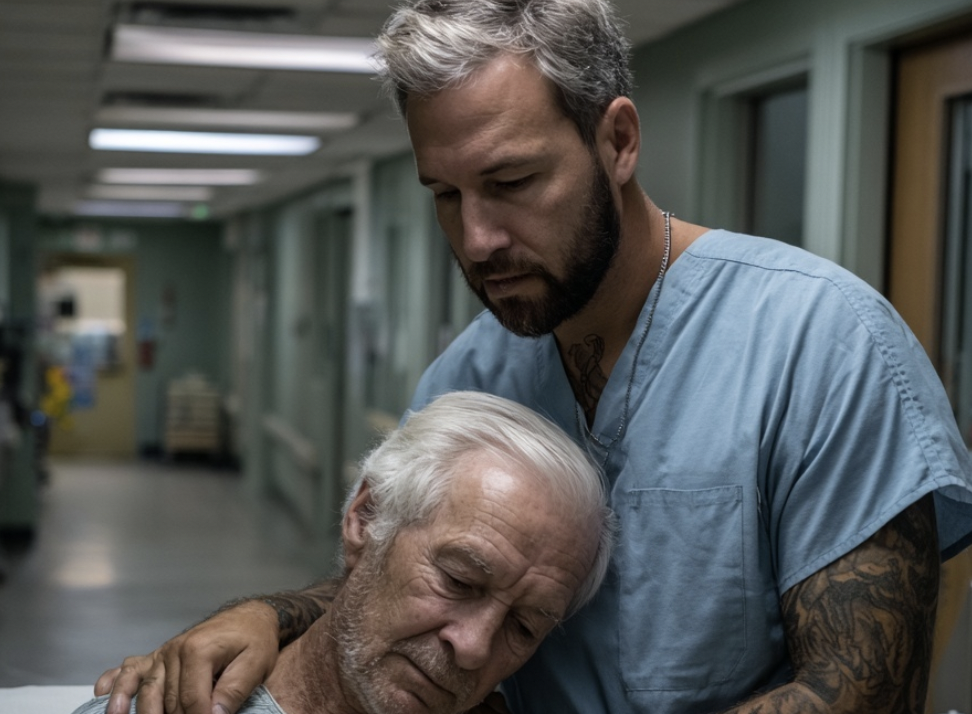— “What’s all this noise? What’s going on here?”
The low, drowsy voice of Sergey Romanovich, the on-duty surgeon, sounded like an echo in the stillness of the late night. He slowly rose from the creaking couch in the duty room, stretching like a lazy lion after its afternoon nap. Squinting his tired yet piercing eyes, he looked toward the nurse at the reception desk. His hair was slightly tousled, his coat buttoned carelessly, but in his gaze was already awakening that steely will that made him a legend among the staff.
In front of him stood Lucy — short-haired, with lively brown eyes full of both embarrassment and defiance. She batted her lashes in a rushed attempt at a charming smile, but Sergey Romanovich might as well have been carved from stone — no weakness, no flicker of interest. He was like a cliff in the middle of a raging sea of human emotions — unshakable, focused, devoted only to his work. Colleagues whispered behind his back, calling him the “God of the Scalpel” — not because he bragged, but because every incision was precise as a verdict of fate, every stitch as if sewn by life itself.
“Forgive us, Sergey Romanovich,” Lucy hurried to say, “we didn’t mean to bother you. Everything’s fine now, it was just a little hiccup… nothing serious.”
But before he could respond, the air was pierced by a sharp, ringing female voice — like an alarm bell:
“Nothing’s fine!” cried Olesya, a young paramedic whose eyes blazed with fire and fists clenched in outrage. “This patient will die if you don’t take him right now! You have no right to refuse! Every second is the line between life and death, and you’re talking as if this were about scheduling tea breaks!”
The nurse shot her a look as sharp as a surgical needle — the kind that could cut through not just skin but dignity itself. But Olesya didn’t flinch. She stood rooted to the spot, like a statue of devotion to duty. Her face was pale with exhaustion but resolute, like a soldier heading into battle.
“Who is it?” asked Sergey Romanovich, now fully awake, his voice hard as steel. “Why the panic?”
“A man, about sixty-five. Severe heart attack. We were resuscitating him on the way, but without surgery he won’t make it. He’s already unconscious, blood pressure near zero. If you refuse now, it’s not a refusal — it’s murder by inaction!”
Lucy tried again:
“Sergey Romanovich, you just finished a complex surgery… You need rest. And the patient… well, he’s homeless. Filthy. We’ve already checked — no documents, no relatives. He’s not going to make it. You’ll just waste your strength…”
Sergey Romanovich turned to her slowly. His eyes became cold as the northern sea in January. He looked at her as if she were no longer a person, but a shadow that had lost the right to call itself a medic.
“Since when,” he said quietly, but with such force that a chill ran down everyone’s spine, “have you become God? Since when do you decide who is worthy of life and who is not? Who gave you the right to choose whom to save and whom to let die in the hallway?”
Lucy shrank as if struck. She tried to explain, but the words stuck in her throat.
“I… I was just thinking about you… your condition…”
“I’m thinking about life,” he cut her off. “About the fact that every person is not a diagnosis, not a social status, not the smell of their clothes. They are a person. And if there’s even one chance — even one! — I’m obliged to take it.”
Olesya exhaled in relief. Her heart beat faster — she knew: this doctor would go. He wouldn’t back down.
“Show me the patient,” ordered Sergey Romanovich, already heading toward the exam room.
When he entered and saw the old man lying on the gurney — gray, tangled hair, worn clothes, a face furrowed by years of hardship and loneliness — something tightened inside him. Not pity. Not compassion. Something greater — the understanding that this was not “a homeless man,” not “filthy,” but a person who had once been someone: a son, a father, a husband. A person who had dreams, love, pain.
And if he didn’t step in now — that person would die. Just like that. Without a chance.
“Prepare the operating room,” he ordered, in a tone that brooked no argument. “Now. Anesthesiologist in the box. Instruments — sterilize. Blood — to the ICU. And in five minutes I want everything ready.”
“But…” began Lucy.
“No ‘buts’!” he barked. “This is not up for discussion!”
His team rushed to obey. Sergey Romanovich closed his eyes for a moment. He was exhausted. His back ached, his temples throbbed with fatigue. But he knew: if he backed down now — he would stop being a doctor.
The surgery lasted nearly six hours. Every minute was like walking through a minefield. Sergey worked with surgical precision, with the concentration of a watchmaker assembling a mechanism. His hands did not tremble. His gaze never wavered. He was like a machine — but a machine with a heart.
When the last stitch was in place, when the patient’s heart stabilized, when the monitors clicked into a steady, healthy rhythm — he allowed himself a full breath.
“Watch him every second,” he whispered to the nurse. “Don’t leave him for a minute.”
Then he stepped outside. The night air wrapped around him like a cool blanket. He lit a cigarette — a rare indulgence — and heard whispers behind him:
“Why’s he so obsessed with that old man? He doesn’t even know who he is…”
“Exactly,” another nurse replied. “Filthy, no papers, stinks… He’ll probably die anyway. And he’s playing hero…”
Sergey didn’t turn around. But inside him, rage flared. Who were they, to measure a human life by clean hands or a passport? Medicine is not a business. It’s a calling. A vow.
The next morning he came to the hospital not in his coat, but in ordinary clothes. He came not as a doctor, but as a man. He wanted to see the old man. To make sure he was alive. That his breathing was steady. That his eyes would open.
The man was weak, but alive. Still in intensive care — his heart not yet strong, blood pressure unstable. But alive.
“I heard you staged quite a rebellion last night,” a colleague smirked. “The nurses are still whispering. They’ve never seen you like that.”
Sergey looked out the window. Beyond the glass — morning light, birds, life.
“Those who don’t value human life,” he said quietly but with icy firmness, “have no place in medicine. Maybe there was a drop of selfishness in what I did — I didn’t want to become someone who walks past. But if it were anyone — rich, poor, famous, forgotten — I’d have done the same. Because I saw a chance. And a chance isn’t just a number on a monitor. It’s hope. And hope cannot be thrown away like trash.”
A drop of selfishness? Yes. He wanted to save this old man because the man had once saved him. But did that make the act any less good? No.
Sometimes good comes back to you.
Sometimes forgiveness doesn’t come from God, but from a person who simply didn’t walk past.
And Mikhail Yevgenyevich — the old man — looked at them, at these “children” his heart had claimed though he hadn’t fathered them, and knew: his life hadn’t been lived in vain. He had left behind not just a memory — but a legacy, in the hearts of those who would carry on his work.



